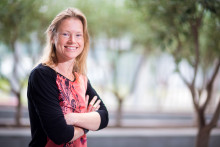In 2021, 33 researchers received a NWO-Vici of 1.5 million euros. Another 17 Dutch scientists received an ERC Advanced Grant of up to 2.5 million euros. For the second year in a row, there are no UT researchers in the list of winners.
When asked, Jan Eijkel, portfolio holder for research at the EEMCS faculty, immediately raises a critical point about the figures. ‘In this case you have to take into account the law of small numbers. No grant is only a small difference with one grant. Nevertheless, the impact of the small difference is huge. Before you get nervous, you have to look at the long term. Is there a trend there? I do not think so at the moment. The chances are that these are small fluctuations.'
Telma Esteves, Team Lead at the Grants Office, a UT office that supports researchers in obtaining grants, also stresses the importance of the long term. ‘We should not draw too many conclusions from a 'bad year'. As a small university, we have a relatively small group of researchers competing for personal grants targeting established researchers. Moreover, the UT is a technical university. Personal grants mostly reward principal investigators who mainly focus on fundamental research. At the UT, the focus is more on multidisciplinary and industrially relevant research.’
Competing for an ERC Advanced or Vici grant requires a long preparation time, Esteves knows. Researchers also have to 'choose' the right moment to submit a proposal. In short: the number of proposals submitted by the UT each year is low. Add to that a relatively low average success rate and the fluctuations are easy to explain, according to Esteves. Sometimes you get nothing, the other year you are among the winners.
Esteves points to the year 2019 in which the UT received three ERC Advanced Grants. 'When we participate, we are often among the winners. Figures show that our internal success rate is well above the European average. For the Advanced Grant, 2019 was an exceptional year, when a total of six UT researchers applied and three received the grant.' According to Esteves, this should have a motivating effect. ‘We should be able to compete more in these personal grants.’
'Those who already have a lot will get even more'
System
Ton van den Boogaard, portfolio holder for research at the ET faculty, also emphasizes the importance of the long term and the law of small numbers. Yet he also raises a point about the current system of personal grants. 'Once you have a grant, it is often an argument for the next one. Hip, high-profile fields of research also score better. Personal grants are prestigious and highly regarded, and rightly so. However, if someone does not receive a grant, that does not mean that their research is bad.’
Wiendelt Steenbergen, portfolio holder for research at the S&T faculty, agrees with this. According to him, established scientists have a certain advantage. ‘Previous achievements play a role in the evaluation of project proposals. Those who already have a lot will get even more. This is known as the Matthew effect. Scientists who have already won a grant have a better chance.’
‘Science funding agencies must ensure that this effect does not get out of hand, because it does little to enhance creativity and thus science. Perhaps a researcher has been busy teaching for the past five years, or there was a temporary dip. This should not be punished in the evaluation of a project proposal.’
'In 2020, we received ten Veni grants. This generation will win the Vici grants for the UT in the future'
Competition
Moreover, less money should be awarded through competition, says Steenbergen. ‘Of course, competition sharpens the wits, but in some cases it is better to give the money directly to the researchers. Sometimes I am surprised by the small chunks that are awarded through fierce competition. Take the NWO Take-off Grant. It is only 40,000 euros, but here, too, a complete competition is set up, including a pitch to the NWO committee. That doesn’t make any sense.’
Scientists' time is scarce. And extremely fragmented. ‘We constantly have to make choices. Do you go for personal grants, for example, or do you opt for consortia. Education, too, demands a lot from our researchers. And don't forget: with TOM, the UT offers an extra intensive form of education.’
This fragmentation of time means that scientists have little time left over to write research proposals, says Steenbergen, although there is a possible solution, the professor adds. ‘Consider the extension of the tuition-free period in summer. In Belgium and Germany, the academic year starts three to four weeks later. For scientists, this is the perfect time to write a research proposal.’
Future
Both Steenbergen and Van den Boogaard emphasize that the faculties and the UT are offering proper support for personal grants. ‘This support has improved enormously in recent years', says Van den Boogaard. ‘A good example of this is SBD-Grants Office. In the near future I expect really good results in this respect. This was also seen in other universities that started a similar support office.’
Esteves points to the recent Veni success in 2020. In that year, ten young UT researchers won a grant of up to 250,000 euros. ‘This is the generation that will be winning Vici and Advanced Grants in the future. The UT can also celebrate other successes more often, for example in the field of education or partnerships, including with industry. We need to provide a platform for that.’
Van den Boogaard agrees. ‘We are already looking more and more at the impact of research. What does society gain from it? We should do that even more often. However, it is still difficult to draw up objective indicators for this. For the time being, a great deal of value is still attached to personal grants.’






